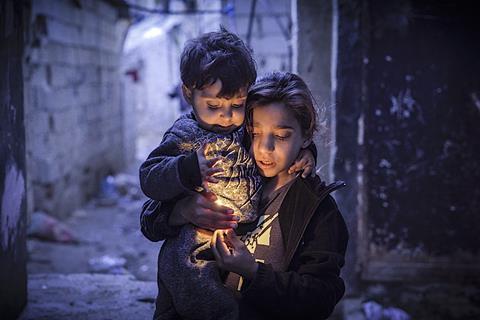Backed by Hillary and Chelsea Clinton, this Lebanon-set documentary presents a troubling portrait of life in Sabra and Shatila

Dirs. Stephen Gerard Kelly, Garry Keane. Germany/Ireland/Lebanon/UK. 2023. 92minutes
More than 40 years after the massacre for which the area is known, Irish directors Stephen Gerard Kelly and Garry Kean visit Sabra and Shatila – a desperate, marginalised place into which waves of displaced people perennially pour. Living in the shadow of Beirut, as the title indicates, its 30,000 inhabitants eke out some sort of existence in one square mile of dirty, impoverished lawlessness on the edge of the slowly failing state of Lebanon; it’s an even smaller and more hopeless place than the subject of Gaza, which was co-directed by Keane and backed by the same production company. The shame this film provokes – or should provoke – in collective society will make it difficult and distressing viewing. And there’s no beauty to show here, despite former cinematographer Kelly’s accomplished work. There’s always love, though. If only there was more to go around.
A story being told by people the world has never listened to
In The Shadow Of Beirut follows four families over four years from 2018, detailing how the twin pincers of Covid-19 and the 2020 port explosion squeezed this already tenuous population. Backed by Hilary and Chelsea Clinton’s Hidden Light production company, Kelly and Keane’s documentary will certainly receive international traction at a time where the word refugee has become so fraught. The people here, their parents and grandparents, fled war, and have become an embedded stateless sector of society, without rights in a Lebanon that can’t and won’t support them, and without the hope of change. Scenes of an eight year-old boy working as a garbage collector or a disabled 11 year-old girl in pain and without medication are hard to watch, yes – but do we have the right to look away?
All four families represent one element of the disenfranchised. The Abeeds fled Civil War in Syria – at eight, Abu Ahmad is the youngest of three siblings living in Shatila with their widowed mother (she is separated from her other four children). It’s “all garbage and rats” as Abu Ahmad tries to tip over bins of decaying produce that are bigger than himself. He works on the streets from 7am-9pm, amidst the beatings and the gun shots and the drugs, for $3 per day. His family has no rights, and neither does Abu Arab, a Palestinian-born vendor who takes pity on him.
In Sabra, Ayman, the seemingly-stern patriarch of the Kujeyje family, keeps his 13-year-old daughter under lock and key, afraid of the consequences for her if she goes outside. An engagement, however, makes matters worse. And despite the fact Ayman was born in Lebanon, neither he, with his Syrian mother, or his children, are entitled to citizenship here: this is generational disenfranchisement.
The Daher family are Dom, or gypsy, and also marginalised in Lebanese society: their daughter Saarea has a painful skin disease and some of her limbs are fused. She looks like a baby, but she is a girl and she is desperately loved. Kelly’s camera watches as the pain of her condition twists the faces of all the family by candlelight.
Finally, Aboodi Ziani is an ex-convict who is absolutely besotted by his infant son – but with a criminal record crippling his ability to work, there’s no future for him here beyond the drugs he falls back into.
There was a certain romantic element which leavened the situation in Gaza or, at least, the sense of a past, a culture, or tradition. There is no such relief in Beirut. Forty years ago, there was a massacre of mostly Palestinian refugees in the Shatila ‘camp’ and neighbouring Sabra: but the displaced have been here since 1948. It grows more and more cramped, especially since the Syrian war; dirtier, with open sewers, no running water or reliable electricity, and it is ever more dangerous.
As they proved with Gaza, producer Brendan F. Byrne and co-director Keane have the right knowledge of this troubled part of the world: together with Kelly, they gain the trust of their subjects in a discreet and sensitive way. There’s no grandstanding or, like Gaza, political point-scoring. This is the portrayal of a desperate part of the world, where geo-political problems come home to rot.
Editor Iseult Howlett helps craft the film into a whole, making sure that any film-making flair – limpid slow-motion sequences, or a moving, guitar-influenced score – is fully at the service of the story being told by people who the world has never listened to.
Production company: Cyprus Avenue Films cyprusavenuefilms@gmail.com
Producer: Brendan F. Byrne
Cinematographer: Stephen Gerard Kelly
Editing: Iseult Howlett
Music: David Holmes, Tim Harries






















